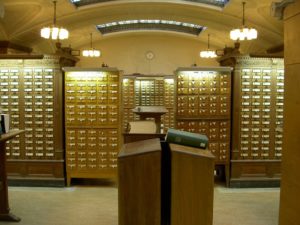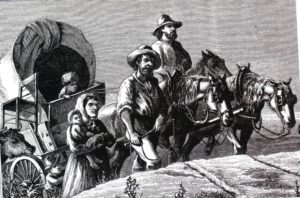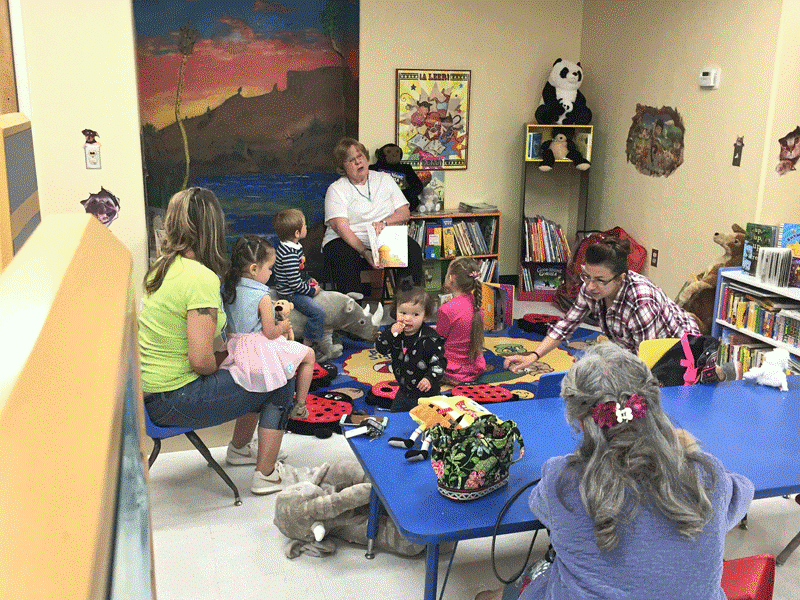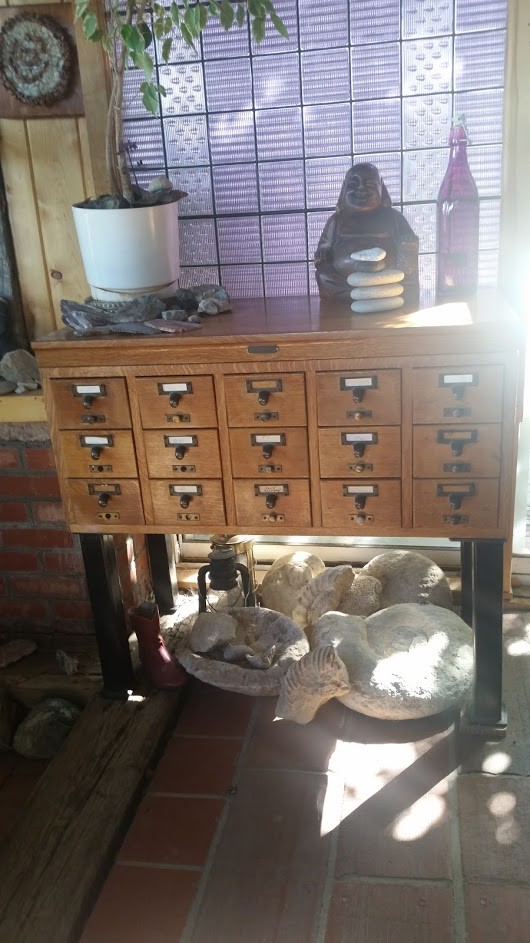“I thought about chaining myself to it,” said one librarian.
“I wanted to steal it,” added another librarian.

To Becky Nell Young, children’s librarian, the card catalog is the foundation of who she is.
Even today when Becky does research online, she sees herself walking to the oak card catalog, opening the drawer with its appealing ring of the brass pull; her fingers riffle through the time-softened cards as she inhales the woody, earthy smell of “accumulated knowledge.”
During her career as a school librarian, she taught library skills in several different venues. She created poster sized flash cards as examples of how to use the card catalog. She helped a group of 25 Boy Scouts earn their library badge. And when G.I.s returned from Vietnam she taught them basic literacy and library skills.
Then in 1993, in San Angelo, Texas, where she worked in 4 different school libraries, “the great migration to the brave new land of uncharted territory began.” As she spoke, she conjured up the image below:

But the migration she experienced looked more like the following:

“Migration” in IT means something entirely different. It is when one operating environment is moved to another, and in most cases, is considered to be a better one, as in “upgrading.”
Nevertheless, it was still a hands-on procedure for Becky. Every night after work for months, she would take a drawer from the card catalog and type all of the information into a computer and save it on a floppy disc.
Some of her mid-career colleagues were opposed to the change from a physical catalog. One reason being that up until digital technology, libraries and librarians had been unchallenged as the sole gate keepers of information for the public.
(And now people who were born before the digital age are referred to as immigrants, some of whom might feel that the learning is like an uphill journey pulling a wagon train.)
For Becky, on-line learning gave her the opportunity to earn her MLS. Otherwise, the nearest University with an ALA approved curriculum, the University of North Texas, was a 5 hour drive from her home and she was already working full-time and raising a family with two boys.
Through this time of changeover, she met with other school librarians in a restaurant where they shared their challenges and problem solved. They called themselves The Dewey Group. One of her colleagues in this group had a fire in her library and all of the accumulated work, all records and digital back-up were lost. After that, the rest of the group decided to keep their backup in their sock drawers at home. (There is no mention of what they ate or had to drink when this decision was made). In case of an emergency, all of their families were told to give the backup to any librarian who requested it.
Going back to her roots, Becky believes that growing up on a cattle and sheep farm near Ft. Stockton Texas, in the dry dusty mesa country, taught her the value of books and reading. There were four generations of teachers and readers in her family. Once a week her family would drive 32 miles to go to the library.
Growing up she read underneath cottonwoods by creeks and in the pecan orchard below their house. She would range over a barren limestone plateau where she found fossils of ammonite, bi-valves and trilobites. Whenever she went off to read or explore, she’d be asked to identify which windmill she’d be near, since every pasture had a windmill for the livestock.
For Becky, dust and old dusty books are linked with good memories. Some old books with ink made from oak galls bring to mind people reading by fireplaces in candle-light.
She remembers having the chance to read an old copy of Ivanhoe that had been carried in a saddlebag for years. It had been read over and over. When Becky asked to hold it, the smell of dust, smoke, cow sweat, and mesquite wafted into her face.
Now when Becky opens a book she is often reminded of cookies. When paper, adhesive and ink degrade over time, they give off organic volatile compounds that smell like vanilla. Almost all wood-based paper contains lignin, which is closely related to vanillin.
She comments too that the smell of books can make people feel calm and safe, as if they’re in a sanctuary, because they’re reminded of their school library.
For these last 10 years after retirement, Becky has been volunteering at the Silver City Public Library, Stout Elementary, and other libraries where she reads stories to children. She imbues the stories with her love of words and the beauty of the books’ illustrations.
While many librarians are now working toward digital literacy for all, Becky states that getting books into children’s hands and promoting children’s reading skills is her life’s purpose.

She is like a gardener planting seeds for the future. Some children will love the power of words, reading and storytelling, and thus the love she shares with them will be passed on.

Photo of Becky’s home catalog with fossils lying underneath.
Footnote: the last catalog card was printed on October 1, 2015, ending an era that lasted more than 150 years.
